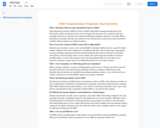
OER Communications Frequently Asked Questions
- Subject:
- Education
- Material Type:
- Reading
- Provider:
- Broken Arrow Summit 2018
- Date Added:
- 09/23/2021

OER Communications Frequently Asked Questions
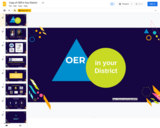
Broken Arrow 2018 Summit: OER In Your District
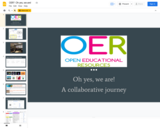
OER? Oh yes we are. Presentation about collaboration and OER.
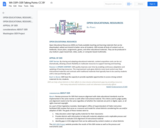
Open Educational Resources (OER) are teaching and learning materials that are freely available that can be downloaded, edited and shared to better serve all students. OER include all kinds of content such as textbooks, lesson plans, assignments, games, and other educational materials. They can be produced in any medium: paper-based text, video, audio, or computer-based multimedia.
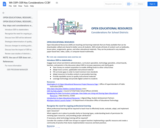
Open Educational Resources (OER) are teaching and learning materials that are freely available that can be downloaded, edited and shared to better serve all students. OER include all kinds of content such as textbooks, lesson plans, assignments, games, and other educational materials. They can be produced in any medium: paper-based text, video, audio, or computer-based multimedia.
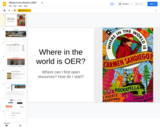
Where can I find OER and where do I start?
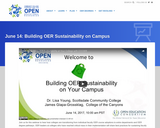
Join us for this webinar to hear how colleges are transitioning from individual faculty OER course adoptions to entire departments and OER degree pathways. OER leaders at colleges who have reached critical mass in their implementation will share best practices for sustaining faculty engagement, student involvement, project funding, and institutional commitment to OER adoption for the enhancement of teaching and learning.
Our featured speakers are both longtime community college leaders in the OER movement at regional and district levels. They will engage each other in discussions on the themes mentioned above and invite questions from webinar attendees.
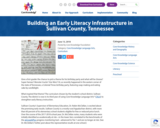
This blog post from the Core Knowledge Foundation highlights the work of Sullivan County, TN, who has been using OER CKLA materials for several years with outstanding results.
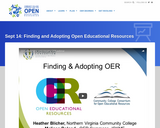
Faculty who are new to OER may experience difficulty finding an open textbook or other openly licensed materials to adopt for their courses. Searching on your own is time consuming and the choices can be overwhelming. We will hear from a college librarian who helps faculty find and adopt high quality OER to match their course outcomes and the creators of the award winning OER Commons, a freely accessible online library that allows teachers and others to search and discover open educational resources (OER) and other freely available instructional materials.

In an era defined by rapid technological advancements, artificial intelligence (AI) has emerged as a transformative force in education. However, the successful integration of AI into a school district’s strategy requires careful planning, preparation, and evaluation. CoSN's collection of resources helps districts in their AI implementation.
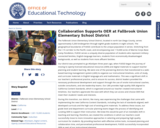
The Fallbrook Union Elementary School District, located in north San Diego County, serves approximately 5,200 kindergarten through eighth grade students in eight schools. The geographical boundaries of FUESD contribute to the unique population it serves. Stretching from the I-15 corridor to the Pacific coast, and encompassing over 110,000 acres of Marine Corps Base Camp Pendleton, FUESD serves a uniquely diverse population of students who represent military-connected families, English-language learners, students from economically disadvantaged backgrounds, as well as students from more affluent families.
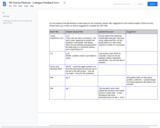
This document might be a solid example of how carefully and collaboratively open resources may be curated by teams of educators.
I left the content in as the main example here, because the form itself is very simple. I have found that district leaders are sometimes interested early on in what it "looks like" to have teachers exert this level of agency over the resources they are curating in such an initiative. I think this can also be valuable for teachers new to the work. Knowing that their professional voice could be leveraged in such a way to create custom materials can be empowering.
Specifically, this tool used as a live form between a team of teachers co-editing a text-based resource on CK-12's platform for "flexbook" creation/curation. The work of alignment to standards and local curriculum was done in a collaborative face to face setting, and then the more fine-grained edits for specific content alignment, factual correctness, and vocabulary synchronicity were done asynchronously through forms such as this one.
Finally, it is important to note that a district curriculum and instruction expert in this area was also involved in vetting some of the edits you see suggested here.
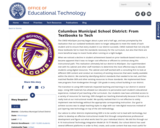
The CMSD #GoOpen journey began about a year and a half ago, and was prompted by the realization that our outdated textbooks were no longer adequate to meet the needs of each student and to ensure that every student in our district succeeds. CMSD realized that not only did these textbooks fail to meet the standards necessary for the curriculum, but also that there are more beneficial ways to invest funds when running on a tight budget.

The #GoOpen Blog is an opportunity for members to highlight the work of #GoOpen states and districts, so that we can learn from one another.
The following information is provided to help you craft your post. Please don’t hesitate to reach out to info@goopen.us with any questions.
Checklist:
Please include the following with your blog post submission:
Blog Title
Word Count – 400-600 words (but if you go shorter or longer, that’s fine!)
Photo, Caption, Attribution & Alt-Text – We’d like you to include a photo that aligns with the content of your post – this can be a photo that you’ve taken, or an openly licensed photo. Please provide a caption for the photo, the proper attribution (See https://wiki.creativecommons.org/wiki/Best_practices_for_attribution best practices for attribution), and alt-text that describes your photo for someone who may be using a screen reader (See https://webaim.org/techniques/alttext/#context best practices for writing alt-text.
Brief Author Bio – Provide a 1-2 sentence bio to let others know who you are and where you are from.
Additional Guidelines
Endorsements:As best practice, GoOpen.us posts and engagement should avoid endorsements of specific companies or products that are meant to promote commercial organizations or businesses. In some cases, mention of commercial entities may be acceptable if the purpose is not to sell products or services but is illustrate an example, further the learning of the group, or document the experience of a #GoOpen Network member and is relevant to the goals of the #GoOpen Initiative.
PII: Any and all personally identifiable information should be removed from the post.
Use: In addition to publishing your post on the #GoOpen Network blog, we will share your post via the #GoOpen Newsletter and social media and encourage you to do the same!
Submission
Email your blog post to info@goopen.us and cc:mailto:sara.trettin@ed.gov
We will review your post and offer suggested edits for clarity or conciseness.
Once you’ve reviewed our suggested edits and accepted any changes, we will schedule your post and let you know when it will be published!
Types of Posts
Not sure where to start? Consider one of these types of posts!
Informational Posts
What’s new in your state or district? Is there a new strategy or approach you are piloting? A topic you are exploring in-depth? An opportunity to collaborate with other states or districts? Informational posts are all about sharing your work with the community!
Reflective Posts
What’s your state or district learning? Has your district team been reflecting on your approach? What have you learned? How are you tweaking your implementation approach? Are you diving into the literature on a particular topic? Reflective posts provide an opportunity to take a step back and share what you are learning with the community!
List Posts
What tips, best practices, lessons learned, or key takeaways can you share that might be helpful for others in the community? These could focus on any aspect of your state or district OER work, for example, three key takeaways from the latest summit or five tips for communicating about your work to parents.
How-to Posts
Have you figured out the perfect approach for some aspect of OER implementation? Consider sharing a step-by-step how-to post that details your approach and any implementation resources so others can follow your lead!
Interview Posts
Have a rockstar teacher, librarian, admin or other OER champion in your state or district? Consider highlighting their work through a brief Q&A post.
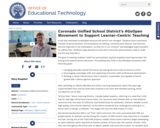
CUSD was motivated to #GoOpen because the learner has changed. “Students have a pervasive mindset of personalization. Personalization of clothing, communication devices, and food has become expected in the marketplace…so why not in our schools?” acknowledged Superintendent Dr. Jeffrey Felix. Students today demand to have their instruction personalized, made to order, just the way they like it.
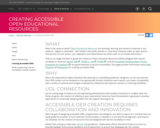
This page provides information about Best Practices and Resources for creating accessible OERs.
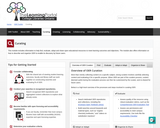
This module includes information to help find, evaluate, adapt and share open educational resources to meet learning outcomes and objectives. The module also offers information on how to describe and organize OER to enable its discovery by future users.
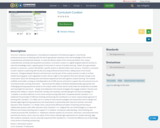
Collection development, a foundational component of the library program, is the formal, professional process of selecting, with the aid of appropriate evaluation tools and knowledge of the school, comprehensive and balanced materials to meet the diverse needs of the community.Rather than using a comprehensive and balanced acquisitions procedure, curriculum curation is a tightly targeted selection process to meet the knowledge and/or cognitive goals of instruction in service of student learning. Rather than generalized pointers to resources, curation will identify a specific section or element within each resource. Therefore, curriculum curation requires co-planning with faculty and using professional discernment, adding value to the chosen resources. Dialogue between librarian and instructor must be part of the curation process In order to surface student learning goals. Such negotiated curation shines a light on the expertise that each educator brings to the conversation about the thinking tasks and relevant experiences that will augment student learning. This module scaffolds and models curating an interdependent set of OER sources and tools to support the instructional core of a unit.Granite State Learning Outcomes3. Demonstrate the ability to facilitate developmentally appropriate and challenging learning experiences based on the unique needs of each learner (and) make the discipline(s) accessible and meaningful for learners;6. Design and implement instructional strategies that engage students’ interests and develop their ability to: inquire; think both critically and creatively; and ethically gain and share knowledge;15. Complete a narrative reflection on the course and personal growth.AASL CompetenciesAASL Standard 1.2 a: Implement the principles of effective teaching and learning that contribute to an active, inquiry-based approach to learning.AASL Standard 1.2 b: Make use of a variety of instructional strategies and assessment tools to design and develop digital-age learning experiences and assessments in partnership with classroom teachers and other educators.AASL Standard 1.3 a: Model, share, and promote effective principles of teaching and learning as collaborative partners with other educators.AASL Standard 1.4 c: Integrate the use of technologies as a means for effective and creative teaching and to support P-12 students' conceptual understanding, critical thinking and creative processes.PSEL Standard 4 a: Implement coherent systems of curriculum, instruction, and assessment that promote the mission, vision, and core values of the school, embody high expectations for student learning, align with academic standards, and are culturally responsive.PSEL Standard 4 e: Promote the effective use of technology in the service of teaching and learning.
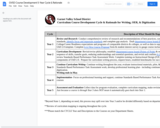
Garnet Valley School District Curriculum Course Development Cycle & Rationale for Writing, OER, & Digitization.
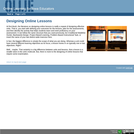
Video about designing online lessons.